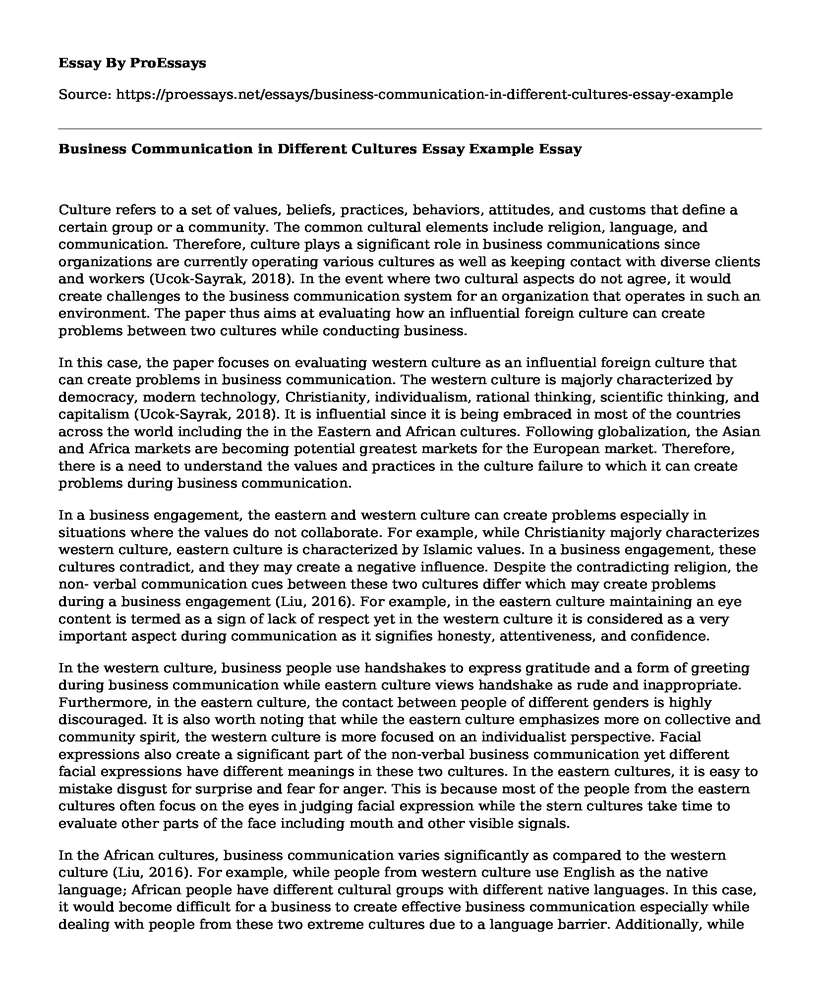Culture refers to a set of values, beliefs, practices, behaviors, attitudes, and customs that define a certain group or a community. The common cultural elements include religion, language, and communication. Therefore, culture plays a significant role in business communications since organizations are currently operating various cultures as well as keeping contact with diverse clients and workers (Ucok-Sayrak, 2018). In the event where two cultural aspects do not agree, it would create challenges to the business communication system for an organization that operates in such an environment. The paper thus aims at evaluating how an influential foreign culture can create problems between two cultures while conducting business.
In this case, the paper focuses on evaluating western culture as an influential foreign culture that can create problems in business communication. The western culture is majorly characterized by democracy, modern technology, Christianity, individualism, rational thinking, scientific thinking, and capitalism (Ucok-Sayrak, 2018). It is influential since it is being embraced in most of the countries across the world including the in the Eastern and African cultures. Following globalization, the Asian and Africa markets are becoming potential greatest markets for the European market. Therefore, there is a need to understand the values and practices in the culture failure to which it can create problems during business communication.
In a business engagement, the eastern and western culture can create problems especially in situations where the values do not collaborate. For example, while Christianity majorly characterizes western culture, eastern culture is characterized by Islamic values. In a business engagement, these cultures contradict, and they may create a negative influence. Despite the contradicting religion, the non- verbal communication cues between these two cultures differ which may create problems during a business engagement (Liu, 2016). For example, in the eastern culture maintaining an eye content is termed as a sign of lack of respect yet in the western culture it is considered as a very important aspect during communication as it signifies honesty, attentiveness, and confidence.
In the western culture, business people use handshakes to express gratitude and a form of greeting during business communication while eastern culture views handshake as rude and inappropriate. Furthermore, in the eastern culture, the contact between people of different genders is highly discouraged. It is also worth noting that while the eastern culture emphasizes more on collective and community spirit, the western culture is more focused on an individualist perspective. Facial expressions also create a significant part of the non-verbal business communication yet different facial expressions have different meanings in these two cultures. In the eastern cultures, it is easy to mistake disgust for surprise and fear for anger. This is because most of the people from the eastern cultures often focus on the eyes in judging facial expression while the stern cultures take time to evaluate other parts of the face including mouth and other visible signals.
In the African cultures, business communication varies significantly as compared to the western culture (Liu, 2016). For example, while people from western culture use English as the native language; African people have different cultural groups with different native languages. In this case, it would become difficult for a business to create effective business communication especially while dealing with people from these two extreme cultures due to a language barrier. Additionally, while the western culture is majorly characterized y individualism, the African culture focuses on collectivism.
Conclusion
In conclusion, culture is crucial in establishing an effective business communication network. Following the internationalization of businesses, it is essential to understand the values and performance of different cultures to eliminate the possible problems that may arise during the business engagement.
References
Liu, M. (2016). Verbal communication styles and culture. Oxford Research Encyclopedia of Communication. doi: 10.1093/acrefore/9780190228613.013.162
Ucok-Sayrak, O. (2018). Intercultural communication: critical approaches and future challenges. Language and Intercultural Communication, 1-3. doi: 10.1080/14708477.2018.1497434
Cite this page
Business Communication in Different Cultures Essay Example. (2022, Nov 20). Retrieved from https://proessays.net/essays/business-communication-in-different-cultures-essay-example
If you are the original author of this essay and no longer wish to have it published on the ProEssays website, please click below to request its removal:
- Case Study Example: Canada and Australia Salmon Importation
- Community Engagement in Engineering Education Paper Example
- Visions of the Ubiquitous Network Society Essay Example
- Essay Sample on College Students Misusing Stimulant Medication: A Growing Concern
- Research Paper on Family and Criminal Law
- Paper Example on Poor Communication in Banking: Impact on Employee Morale, Ethics, & Performance
- Paper Example on Uplifting Lives: Community Education's Unseen Role







